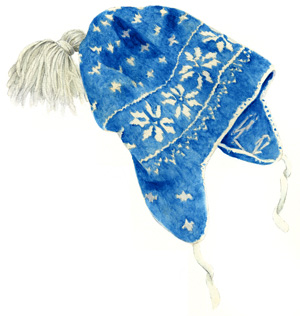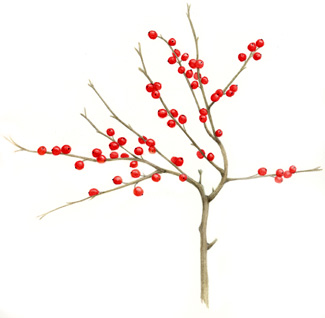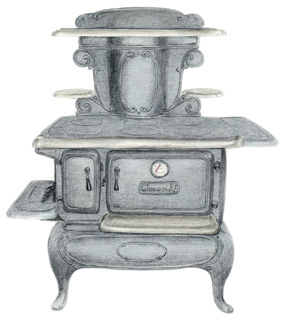
Illustration by Sam Manning.
—E.B. White
Dear Friends:
From the summit of Awanadjo—Blue Hill, or “Small Misty Mountain” in the Algonkian language—the forests stretching off to the north, west, and south are turning brown and bare in November, just as they have every autumn since the last ice mountains melted away 12,000 years ago. Late migrating hawks and gyring eagles soar through the primordial atmosphere overhead as their ancestors have through many ice ages. The mountains around us—Acadia, the Camden Hills, Great Pond, Schoodic—rise rocky and bare in the far four directions, as they have for millions of years. The sea wears a somber gray as it curves away from our gaze and flows over the horizon to the east, just as it has for billions of years. The land below us has been inhabited by our kind for millennia, and has seen many tribes stride its paths and many flags fly above it: and will surely see still other flags in times to come. From the summit we view the town and the fairgrounds below appearing much as they have for generations. We can make out three white steeples, seemingly identical from the height upon which we stand, regardless of the differing creeds preached beneath them. We can see the tidy houses of citizens of every political persuasion all looking alike from the heights.
Through time out of mind these far forests and the blueberry fields down there have turned and changed with the countless seasons, rising from root or seed; burning or falling to the ground to rise again and provide food and fruit for the myriads of creatures. The creatures have likewise gathered and planted seeds by their natural ways, borne and raised their young, taken no more than they needed, wasted nothing, and always improved the environment for every other creature. With all our art and craft, we can do no better or greater thing than this.

Illustrations by Candice Hutchinson [3].
From Richard Jeffries: “The lost leaves measure our years; they are gone as the days are gone, and the bare branches speak silently of a new year….”
Field and forest report, early November
Winds and rains have brought down most of the leaves, except for those of the hardy red oaks. These still hang on their twigs, brown and dry as old leather, and whisper as they take the breeze. The needles of the eastern larch, also known as tamarack, or hackamatack in Algonkian, are showing their beautiful burnt gold as they prepare to fall in showers. With many nights still frost-free and many days still warm, the grass remains green and growing with an occasional dandelion shyly blooming close to the ground.
Mountain report, early November
On the west shoulder of Awanadjo there are shriveled blueberries, brilliant scarlet leaves of rambling rose, the occasional intrusive Russian Olive bush, and the mysterious messages etched on ancient stones by the patient scribes of time and weather.
Natural events, mid to late November
Colder weather flows down from the north over mountains, fields, and waters, gradually lulling the countryside to sleep with November’s slow and gentle anesthetic. The darkness lingers later each morning, and fussing parents try to put hats and gloves on their children, only to see them pulled off as soon as the door closes and the kids head for the school bus. Oldsters spend more time in their favorite chair by the wood stove. The birdbath freezes and thaws: then it stays frozen all through one day and into the next. In shady places to the north of the house or of a row of trees, the cold sinks deeper into the ground and raises it up in crystals that crunch under foot. Frost coats the windows during the night, turning them into stained glass, holding the glories of sunrise, until the warming light sends trickles down the panes, and they clear again. Puddles freeze over and roofs are rimed with white as the waning moon fades and falls in the west. Jack o’ lanterns freeze and thaw and turn to pumpkin pudding, their jolly October smiles melting into grotesque November scowls in their unlit empty heads.
Field and forest report, mid to late November
Tippers work away in the woods and wreath-makers labor indoors, enveloped in the sweet scent of balsam while their hands turn black with sticky rosin. Hunters park off the highway and head down woods roads in quest of the Legendary Buck they’ve dreamed about since their youth: six feet high at the shoulder, with antlers as wide as the tree-tops and a call like God’s trombones. The wild turkeys stay close to the big woods hoping to cut their losses. Winterberry,
Ilex verticillata, our native holly, offers up deep-orange berries in airy arches and spires over bare branches. Flocks of robins feast on the berries in the warmth of the day, chirping happily as though summer had not died.
Mountain report, late November
Ribbons of run-off freeze on the woods trails and over rock. The red squirrels cease their scolding at intruders and spend most of the day in their leaf-lined nests in the hollows of dead snags, dreaming and contemplating the Squirrel Dharma. The wind on the bare, ice-scoured summit bites the face. Fewer climbers make the ascent these days and a man can find some real solitude with his thoughts as he makes his way up the slope while his earthly troubles slough off and blow away.
Field and forest report, Thanksgiving
Last year I saw a huge wild Tom turkey run across the road above Walker’s Pond. He looked nearly as big as an ostrich, with red head and wattles and stiff black bristles sticking out from his chest. Why does a turkey cross the road? To give thanks when it gets to the other side.
A Thanksgiving message from Erma Bombeck
“Thanksgiving dinners take 18 hours to prepare. They are consumed in 12 minutes. Half-times take 12 minutes. This is not a coincidence.”
Saltwater report, late November
The last lobster traps are hauled while the fish move out to deeper and warmer waters. Meanwhile, experts continue to report that at the present rate the world’s major commercial fishing stocks will have collapsed by mid-century.
There are things you and I can do about it, however. We can support local resource management in which fishermen are involved in determining when, where, and what will be fished. We can also eat less larger fish and more smaller ones, such as herring and mackerel. These also contain less mercury and other pollutants and more healthy omega fats. Bring on the sardines.
Natural events, early December
Last year at this time we went to our Cobscook Field Station to cut some balsam fir Christmas trees. First thing was to build a fire in the old wood stove to warm the place. Once it started roaring, I was horrified to see the flames shining orange through rust holes in the stovepipe. Things get rusty in an unheated camp that just might have a couple of leaks in the roof.
I quickly found an extra elbow in the wood shed, shut the draft, pulled off the old pipe, and stuck a saucepan in the smoke outlet. I carried the smoking hot pipe outside, tore off the crumbling old elbow, fitted the new one, and put the pipe back in place as the fire roared to life.
One disaster was averted, but another was soon seen at the shore, where the great old spruce in which the eagles always perched had blown down in the high winds of the previous week. The smell of resin and ruptured wood filled the air as I mournfully paced off its fallen height at over 80 feet—too tall for Rockefeller Center. It left a big hole in the sky, and in my heart.
After a peaceful night under silent stars and then a camp breakfast, I cut some sweet-smelling fir trees. The previous year we brought home two. This year we had five trees tied on top and packed in the back of my little pick-up.
Natural events, mid December
By this time of year we have had some real snow. Mostly white. Now and then we’ll get a mysterious mix of snow, rain, sleet, and drizzle, all together resulting in a rare snow cover that is unquestionably blue when the sun reflects in a footprint or glows through a thin drift. When the clouds hang low, wooly and dark gray in a “snow sky,” we listen to the automated voice on NOAA weather radio. We call him “Luke Warm.” He talks about snow in “CariBOU.”
“Luke” has replaced “Sven,” whose automated voice had a stilted Scandinavian accent and told us it would be “partally cloudy” or “mostally cloudy.”
Snow is the great equalizer. The prince, the pauper, the preacher, and the teacher all wait for the humble plowman to plow them out. The tracks of one in the snow are like the other. Snow is not colder for one than for another. Snow is not warmer for the rich than for the poor. It is not easier to shovel for the saint than the sinner.
Snow pays no attention to our business, but simply goes about its own business, covering the earth in a soft blanket so the soil can safely sleep until spring. It blankets a million-dollar trophy house and a mobile home just the same.
Snow cares not how important we think we are. It cares not whether we are a CEO or an SOB (which are occasionally the same) or whether we have a PhD or a GED. Snow cares not whether we’ve been bad or good.
Snow is a great leveler. It smoothes out distinctions, and makes the rough places a plain. It chills our fingers and toes, but it warms our hearts to shovel out our neighbor and push a stranger’s car out of a ditch. A big snow freezes us all up, and yet miraculously frees us all up to greet each other on the snowy street and talk as we haven’t for too long. It makes us friendly and outgoing and truly human again, because we are all in it together, like being on a pilgrimage with others or meeting at a medieval fair.
Rich or poor, king or commoner, for a time are all alike, taking on the task of making a living in a cold, snowy world.
Seedpod to carry around with you, December
From Henry David Thoreau: “The thin snow now driving from the North lodges on my coat. How full of the creative genius is the air in which these flakes are generated. I could hardly more admire if real stars fell and lodged on my coat.”
Mountain report, mid December
Climbing Awanadjo we find ourselves quite alone on the mountain for the first time in many months. No other voices. No ATVs. Blessed quietness. Frozen waterfalls hang from mossy cliffs. Pools are covered with paisleyed windowpanes of ice. The clouds hang very low and heavy-laden over the summit, giving me the sense of walking up into the heavens to meet the Maker. I come back down reluctantly—but renewed—once again.
Handyman Hint, January
Your commentator has been heating with wood since 1972, but a dramatic new improvement has been discovered. For years we’ve carried armfuls of wood or struggled with various slings or racks or wheelbarrows over the 20 steps of rough ice or snow drifts from the woodshed to the house. Now we’re using a large 2½-bushel fish tote with a rope loop tied to one handle to drag our load of wood over the snow or ice, up the steps, and right into the house, slick as a whistle. It is practically effortless compared to the old way. You’ve got to try it.
Saltwater report, late January
Last year at this time we went down to the banks of the magnificent and sacred Blue Hill Falls—Kollejedjwok in Algonkian—to watch the eider ducks going about their daily lives as the tide was going out. Despite the bitter cold, these sea ducks were as busy as at any other season. In their down coats—plain brown for the ladies and formal black and white for the gents—they survive all weather. A flock of sandpipers flew from ledge to ledge in perfect formation, now turning all at once to flash their white underwings, then turning again to disappear as their gray topsides melted into the color of the water, then landing on one tiny stone island after another to peck about daintily for their daily food. The great glacial rocks wore perfect snowy crowns above the high tide line and glowed golden in the late afternoon sun. Cloudy ice glazed the tidal pools. The falls in their ancient course churned and roared, smoothing and polishing the big stones in their way and sending up clouds of floating mist, while strands of kelp bobbed up and down in the flow.
That’s the almanack for this time. But don’t take it from us—We're no experts. Go out and see for yourself.
Yr. mst. hmble & obd’nt servant,
Rob McCall
Correction: There was an error in last issue’s Almanack (Field and Forest Report, Late August). The birch leaf miner is not a caterpillar, although it looks like one, but a maggot. It belongs to the order Hymenoptera, not Orthoptera.
“Awanadjo” is Algonkian for “Small Misty Mountain,” and refers to Blue Hill—a mountain on the Maine coast—or to your mountain. The Awanadjo Almanack is broadcast 7:30 a.m. Fridays and 8:30 a.m. Sundays on WERU-FM (89.9 FM) and can be heard online worldwide at weru.org. It also appears in this magazine, and has for over a decade. Selections from our first ten years are available in a hard-cover edition, Small Misty Mountain, published by Pushcart Press/W.W. Norton. Ask your bookstore to order it.
If the Almanack speaks to you, we ask you to kindly tell your friends about it. And if you are visiting the Blue Hill peninsula, for heaven’s sake let us know. Perhaps we can get together for a hike up the mountain, or a cup of tea.

Rob McCall is a journalist, naturalist, fiddler, and for the past 23 years, pastor of The First Congregational Church of Blue Hill, Maine, UCC. This almanack is excerpted from transcripts of his weekly radio show, which can be heard on WERU, 89.9 FM Blue Hill and 102.9 FM Bangor, and streamed live via
www.weru.org. Readers can contact him directly via e-mail:
awanadjoalmanack@gmail.com.
 Illustration by Sam Manning.
Illustration by Sam Manning. Illustrations by Candice Hutchinson [3].
Illustrations by Candice Hutchinson [3].








